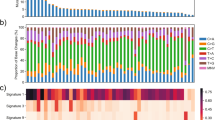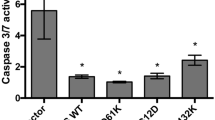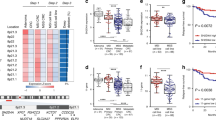Abstract
Methylation-associated inactivation of RASSF1A has frequently been observed in several human malignancies including sporadic colorectal and gastric cancer. However, nothing is known about the RASSF1A methylation status in the setting of MMR-deficient gastrointestinal tumours. In this study, we analysed systematically alterations in KRAS, BRAF and RASSF1A, in order to define the frequency and the pattern of these genetic/epigenetic alterations in three distinct subsets of MSI gastrointestinal tumours. Further, an association study was performed between RASSF1A methylation and the clinicopathological parameters in order to determine the profile of tumours harbouring this epigenetic event. A total of 56 MSI sporadic gastrointestinal tumours (31 colorectal and 25 gastric) and 20 MSI HNPCC analysed for KRAS/BRAF were analysed for RASSF1A promoter hypermethylation by MSP and DNA sequencing. No significant differences were found between the frequency of RASSF1A methylation in sporadic MSI colorectal and gastric carcinomas and HNPCC carcinomas (P=0.31). Methylation of RASSF1A was present in 16 of 31 (52%) sporadic MSI colorectal and 11 of 25 (44%) MSI gastric carcinomas, and in six of 20 (30%) HNPCC carcinomas. Nearly 36% of MSI sporadic colorectal carcinomas (CRCs) had RASSF1A methylation and activating mutations at KRAS and/or BRAF. In contrast, only 10 and 8% of HNPCC and sporadic gastric carcinomas, respectively, had concomitant KRAS mutations and RASSF1A methylation. The MSI sporadic gastric and CRCs with RASSF1A methylation were preferentially poorly differentiated (P=0.03, 0.05, respectively). We show that the profile of alterations RASSF1A, KRAS/BRAF is different among the three groups of MSI gastrointestinal tumours. Further, we demonstrate that MSI sporadic CRCs accumulated significantly more epigenetic/genetic alterations in RASSF1A, KRAS/BRAF than MSI sporadic gastric or HNPCC carcinomas (P=0.016). These results are likely to have therapeutic implications in the near future, due to the possibilities of using specific kinase inhibitors alone or in association with demethylating agents in MSI tumour types harbouring KRAS or BRAF mutations and RASSF1A methylation.
This is a preview of subscription content, access via your institution
Access options
Subscribe to this journal
Receive 50 print issues and online access
$259.00 per year
only $5.18 per issue
Buy this article
- Purchase on Springer Link
- Instant access to full article PDF
Prices may be subject to local taxes which are calculated during checkout


Similar content being viewed by others
References
Brennetot C, Duval A, Hamelin R, Pinto M, Oliveira C, Seruca R and Schwartz Jr S . (2003). Gastroenterology, 125, 1282.
Byun D, Lee M, Chae K, Ryu B and Chi S . (2002). Cancer Res., 61, 7034–7038.
Dammann R, Li C, Yoon JH, Chin PL, Bates S and Pfeifer GP . (2000). Nat. Genet., 25, 315–319.
Dammann R, Schagdarsurengin U, Strunnikova M, Rastetter M, Seidel C, Liu L, Tommasi S and Pfeifer GP . (2003). Histol. Histopathol., 18, 665–677.
De Caceres II, Battagli C, Esteller M, Herman JG, Dulaimi E, Edelson MI, Bergman C, Ehya H, Eisenberg BL and Cairns P . (2004). Cancer Res., 64, 6476–6481.
Deng G, Bell I, Crawley S, Gum J, Terdiman JP, Allen BA, Truta B, Sleisenger MH and Kim YS . (2004). Clin. Cancer Res., 10, 191–195.
Domingo E, Espín E, Armengol M, Oliveira C, Pinto M, Duval A, Brennetot C, Seruca R, Hamelin R, Yamamoto H and Schwartz Jr S . (2004a). Genes Chromosomes Câncer, 39, 138–142.
Domingo E, Laiho P, Ollikainen M, Pinto M, Wang L, French AJ, Westra J, Frebourg T, Espin E, Armengol M, Hamelin R, Yamamoto H, Hofstra RM, Seruca R, Lindblom A, Peltomaki P, Thibodeau SN, Aaltonen LA and Schwartz Jr S . (2004b). J. Med. Genet., 41, 664–668.
Koinuma K, Shitoh K, Miyakura Y, Furukawa T, Yamashita Y, Ota J, Ohki R, Choi YL, Wada T, Konishi F, Nagai H and Mano H . (2004). Int. J. Cancer, 108, 237–242.
Lerman MI and Minna JD . (2000). Cancer Res., 60, 6116–6133.
McGivern A, Wynter CV, Whitehall VL, Kambara T, Spring KJ, Walsh MD, Barker MA, Arnold S, Simms LA, Leggett BA, Young J and Jass JR . (2004). Fam. Cancer, 3, 101–107.
Oliveira C, Pinto M, Duval A, Brennetot C, Domingo E, Espin E, Armengol M, Yamamoto H, Hamelin R, Seruca R and Schwartz Jr S . (2003). Oncogene, 22, 9192–9196.
Oliveira C, Westra JL, Arango D, Ollikainen M, Domingo E, Ferreira A, Velho S, Niessen R, Lagerstedt K, Alhopuro P, Laiho P, Veiga I, Teixeira MR, Ligtenberg M, Kleibeuker JH, Sijmons RH, Plukker JT, Imai K, Lage P, Hamelin R, Albuquerque C, Schwartz Jr S, Lindblom A, Peltomaki P, Yamamoto H, Aaltonen LA, Seruca R and Hofstra RM . (2004). Hum. Mol. Genet., 13, 2303–2311.
Ortiz-Vega S, Khokhlatchev A, Nedwidek M, Zhang XF, Dammann R, Pfeifer GP and Avruch J . (2002). Oncogene, 21, 1381–1390.
Pfeifer GP, Yoon JH, Liu L, Tommasi S, Wilczynski SP and Dammann R . (2002). Biol. Chem., 383, 907–914.
Rajagopalan H, Bardelli A, Lengauer C, Kinzler KW, Vogelstein B and Velculescu VE . (2002). Nature, 418, 934.
Reifenberger J, Knobbe CB, Sterzinger AA, Blaschke B, Schulte KW, Ruzicka T and Reifenberger G . (2004). Int. J. Cancer, 109, 377–384.
Shivakumar L, Minna J, Skamaki T, Pestell R and White MA . (2002). Mol. Cell. Biol., 22, 4309–4318.
Umar A, Risinger JI, Hawk ET and Barrett JC . (2004). Nat. Rev. Cancer, 4, 153–158.
Van Engeland M, Roemen G, Brink M, Pachen M, Weijenberg M, Bruïne A, Arends J, Brandt P, Goeij A and Herman J . (2002). Oncogene, 21, 3792–3795.
Vos MD, Ellis CA, Bell A, Birrer MJ and Clark GJ . (2000). J. Biol. Chem., 275, 35669–35672.
Williams JG, Drugan JK, Yi GS, Clark GJ, Der CJ and Campbell SL . (2000). J. Biol. Chem., 275, 22172–22179.
Xing M, Cohen Y, Mambo E, Tallini G, Udelsman R, Ladenson PW and Sidransky D . (2004). Cancer Res., 64, 1664–1668.
Yuen ST, Davies H, Chan TL, Ho JW, Bignell GR, Cox C, Stephens P, Edkins S, Tsui WW, Chan AS, Futreal PA, Stratton MR, Wooster R and Leung SY . (2002). Cancer Res., 62, 6451–6455.
Acknowledgements
Grant support: Spanish Fondo de Investigaciones Sanitarias (FIS 01/1350); Portuguese Fundação para a Ciência e Tecnologia (POCTI/CBO/44849/2002; POCTI/SAU-OBS/56921/2004); The Dutch Cancer Society (RUG2002-2678); The Ministry of Education, Culture, Sports, Science and Technology of Japan; and Grant-in-Aid for the Third Term Comprehensive 10-Year Strategy for Cancer Control from the Ministry of Health, Labor and Welfare of Japan. ED was supported by a fellowship from the Spanish Fondo de Investigaciones Sanitarias. CO, SV and AP were supported by fellowships from the Portuguese Fundação para a Ciência e Tecnologia.
Author information
Authors and Affiliations
Corresponding author
Rights and permissions
About this article
Cite this article
Oliveira, C., Velho, S., Domingo, E. et al. Concomitant RASSF1A hypermethylation and KRAS/BRAF mutations occur preferentially in MSI sporadic colorectal cancer. Oncogene 24, 7630–7634 (2005). https://doi.org/10.1038/sj.onc.1208906
Received:
Revised:
Accepted:
Published:
Issue Date:
DOI: https://doi.org/10.1038/sj.onc.1208906
Keywords
This article is cited by
-
Aberrant Promoter Hypermethylation of p16 and RASSF1a Genes in Colorectal Cancer – Significance in Young Patients
Indian Journal of Surgical Oncology (2021)
-
Inhibition of nuclear factor-kappa B enhances the tumor growth of ovarian cancer cell line derived from a low-grade papillary serous carcinoma in p53-independent pathway
BMC Cancer (2016)
-
Microsatellite instability in gallbladder carcinoma
Virchows Archiv (2015)
-
RETRACTED ARTICLE: Aberrant promoter methylation of RASSF1A gene may be correlated with colorectal carcinogenesis: a meta-analysis
Molecular Biology Reports (2014)
-
Promoter hypermethylation of RASSF1A, MGMT, and HIC-1 genes in benign and malignant colorectal tumors
Tumor Biology (2011)



